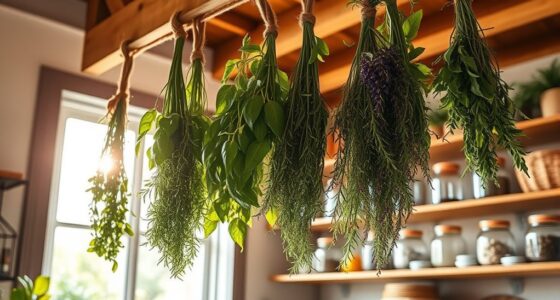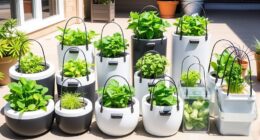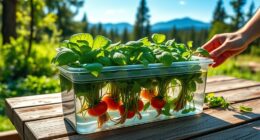To dry herbs like a chef, start by selecting healthy, fresh leaves and gently rinse them. Hang small bunches upside down in a dark, well-ventilated area or use a dehydrator at around 95°F for quicker results. make certain herbs are fully dry before storage to prevent mold, and keep them in airtight containers in a cool, dark place. Paying attention to proper drying and storage helps preserve flavor and aroma longer—if you continue exploring, you’ll master perfect herb preservation.
Key Takeaways
- Select healthy, peak-condition leaves and harvest just before flowering for maximum flavor.
- Use gentle rinsing and thorough drying to prevent mold and preserve herb quality.
- Hang herbs upside down in a dark, well-ventilated space or use a dehydrator set to about 95°F.
- Ensure herbs are completely dry before storing in airtight, dark containers to maintain aroma and potency.
- Store dried herbs in a cool, dark place and use within a year for optimal flavor preservation.

Have you ever wondered how to preserve fresh herbs for later use? Drying herbs is one of the simplest and most effective methods to do just that. When it comes to herb storage, drying allows you to keep your herbs flavorful long after the growing season ends. The key is to dry your herbs properly to maximize flavor retention. If you rush the process or use improper techniques, you risk losing that vibrant aroma and taste you love. By understanding the best ways to dry herbs, you can enjoy their fresh, fragrant qualities whenever you want.
Drying herbs preserves their flavor and aroma for long-lasting, garden-fresh taste anytime.
The first step in successful herb drying is selecting the right herbs at their peak. Choose healthy, undamaged leaves, ideally just before they flower, when their flavor is most concentrated. Once harvested, gently rinse the herbs to remove dirt or insects, then pat them dry thoroughly. Excess moisture can lead to mold or spoilage during the drying process, which ruins both herb storage and flavor retention. After drying, you’ll want to find a warm, dry, well-ventilated space away from direct sunlight. Sunlight can degrade essential oils, diminishing the herbs’ aroma and potency.
To dry herbs, you can tie small bunches with twine and hang them upside down in a dark corner. This traditional method promotes even drying and prevents moisture from lingering in the leaves. Alternatively, if you prefer a quicker process, using a dehydrator set to a low temperature (around 95°F or 35°C) works well. You could also spread herbs on a baking sheet and dry them in an oven on the lowest setting, leaving the door slightly open to allow moisture to escape. Whichever method you choose, guarantee the herbs are completely dry before storing—any residual moisture can cause mold and compromise flavor.
Proper herb storage after drying is essential. Store your dried herbs in airtight containers like glass jars, ideally in a cool, dark place. This prevents exposure to light and heat, which can degrade essential oils and diminish flavor over time. When herbs are stored correctly, their flavor retention can last for months, allowing you to enjoy the rich, aromatic qualities of your indoor harvest well into the season. Remember, the longer you store dried herbs, the more their flavor may fade, so aim to use them within a year for the best taste.
Drying herbs like a chef isn’t complicated, but it does require attention to detail. By selecting the right herbs, drying them properly, and storing them correctly, you preserve their flavor, aroma, and freshness. Now, whenever you need a burst of garden-fresh flavor, you can reach for your dried herbs and enjoy their fragrant, robust taste just as you would fresh ones.
Frequently Asked Questions
How Long Do Dried Herbs Typically Last?
Dried herbs usually last about 1 to 3 years, depending on storage conditions. Proper herb shelf life depends on keeping them in airtight containers, away from sunlight, heat, and moisture. Follow storage tips like labeling your herbs and checking for freshness regularly. Over time, flavor and potency fade, so it’s best to use your dried herbs within this period for ideal taste and aroma.
Can I Dry Herbs Without Any Special Equipment?
Drying herbs without special equipment is like letting a book dry out in the sun—simple and effective. You can use air drying techniques by bundling herbs and hanging them upside down in a well-ventilated, dry spot. This method preserves herbal flavor retention, making your herbs flavorful and aromatic. Just make certain they’re away from direct sunlight, and you’ll enjoy fresh-tasting dried herbs without any fancy tools.
What Are Signs That Herbs Are Over-Dried?
When you over-dry herbs, you’ll notice herb flavor loss and color fading. The herbs become brittle and crumbly, losing their vibrant appearance. Their aroma diminishes, and they may turn dull or brownish. If you see these signs, it’s a clear indication you’ve dried them too long. To prevent this, check your herbs frequently during drying and remove them once they’re still slightly pliable for ideal flavor and color.
Is It Better to Dry Herbs Whole or Chopped?
Think of drying herbs like a symphony—every note counts. Drying herbs whole preserves their delicate herb flavor longer, as chopping techniques can release oils prematurely, risking loss of aroma and potency. While chopping is convenient for culinary use, drying herbs whole keeps their essential oils intact, resulting in more flavorful herbs. So, for the best herb flavor, dry them whole and chop just before use.
How Do I Store Dried Herbs for Maximum Freshness?
To store dried herbs for maximum freshness, focus on proper herb storage techniques that preserve flavor. Keep your herbs in airtight containers, like glass jars, away from direct sunlight and heat. Store them in a cool, dark place to prevent loss of aroma and potency. Regularly check your herbs for moisture or mold, and label them with the drying date. These herb storage techniques guarantee your herbs stay flavorful and aromatic longer.
Conclusion
By drying herbs correctly, you preserve their flavor, aroma, and liveliness. You honor your harvest, respect nature’s bounty, and enjoy your kitchen’s richness. You embrace patience, practice precision, and celebrate your effort. You turn fresh into lasting, vibrant, and flavorful. You connect with tradition, enhance your cooking, and nurture your well-being. In drying herbs, you do more than preserve—you create, you sustain, you transform. So keep practicing, keep learning, and keep savoring every step of the way.









